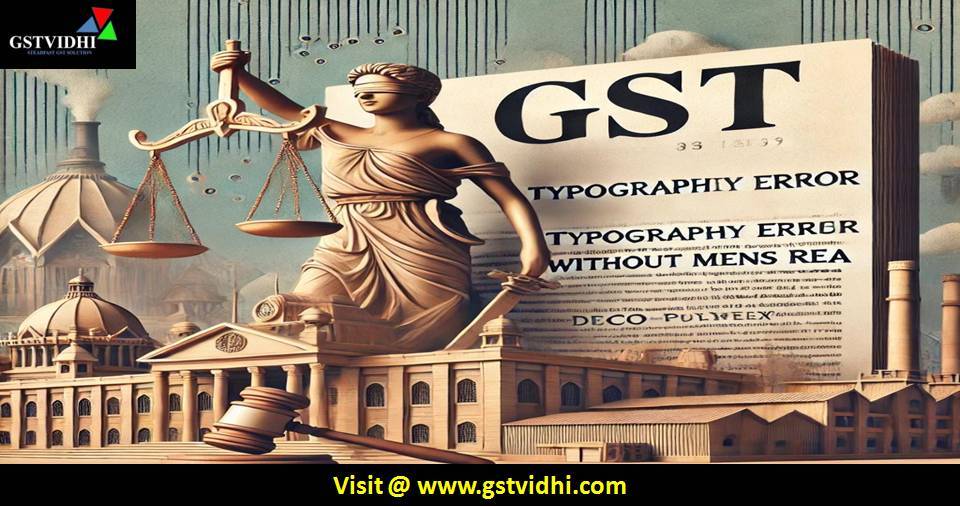
Typographical Error
Without Mens Rea: Allahabad High Court Quashes GST Penalty Against Deco Plywood
Industries
By Yogesh Verma (CS/LLB) / 2 min read / GST Case Law
Case No.: WRIT TAX No. 1136 of 2022
Petitioner: M/S Deco Plywood Industries
Respondents:
1. State of Uttar Pradesh
2. Commercial Tax Officer-2 (Mobile Squad), Range-IV, Agra
3. Additional Commissioner Grade-2 (Appeal), Commercial Tax,
Agra
Counsel for Petitioner: Shubham Agrawal
Counsel for Respondent: C.S.C.
Court: High Court of Judicature at Allahabad (Court No. 1)
Date of Order: 5th March 2024
Judging Authority: Hon'ble Shekhar B. Saraf, J.
Summary of the Case: M/S Deco Plywood Industries challenged the imposition of a
penalty under Section 129 of the CGST Act, 2017, for a typographical error in
the e-way bill during the transport of goods. The petitioner argued that the
discrepancy was unintentional and caused no tax evasion. The court quashed the
penalty order, emphasizing that minor errors without intent to evade tax should
not attract penalties.
Facts of the Case:
1.
Nature of Business:
M/S Deco Plywood Industries is a registered dealer under the CGST Act, dealing
in plywood and allied products.
2.
Transaction:
Goods were being transported to M/S Mahalaxmi Associates, Mumbai, covered by a
tax invoice, bilty, and e-way bill, all dated 27th January 2021.
3.
Interception:
On 30th January 2021, the vehicle was intercepted by GST authorities due to a
mismatch in the document number: E-way bill mentioned 2224 instead of the
correct invoice number 0401.
4.
Penalty Imposed:
The authorities imposed a penalty citing this error, although all other
documents matched, and the consignee was a registered dealer.
5.
Appeal: The
petitioner unsuccessfully appealed against the penalty order to the Additional
Commissioner Grade-2, leading to the present writ petition.
Submission by the Petitioner
1.
The discrepancy in the e-way bill
was a typographical error.
2.
The transaction was legitimate, with
no intent to evade taxes.
3.
Relied on precedents:
·
M/s Varun Beverages Ltd. vs. State
of U.P.: Allowed relief in cases of minor discrepancies.
·
Assistant Commissioner (ST) vs. M/s
Satyam Shivam Papers Pvt. Ltd.: Highlighted the importance of intent (mens rea)
in penalty cases.
Submission by the Respondent
1.
The Department argued that its
circular allows non-imposition of penalties only for errors of up to two
digits, not for larger discrepancies like in this case.
2.
They distinguished the cited
precedents, claiming that those cases were different in nature (e.g., stock
transfer or expired e-way bills).
Findings and Judgment
1.
Legal Analysis:
·
The court emphasized the principle
of mens rea, stating that penalties under Section 129 require intent to evade
tax.
·
Typographical errors without
evidence of tax evasion should not attract penalties.
·
Cited precedents supported this
principle.
2.
Judgment:
·
The penalty imposed due to a
four-digit discrepancy in the e-way bill was deemed disproportionate and
without jurisdiction.
·
Orders dated 1st February 2021
(penalty) and 17th June 2022 (appellate rejection) were quashed.
3.
Relief Granted:
·
The court directed the respondents
to provide consequential relief to the petitioner within four weeks.
Conclusion: The court reinforced the principle that procedural errors,
such as typographical mistakes, should not lead to penalties unless accompanied
by intent to evade taxes. It highlighted the need for equitable application of
the law in such cases.
Disclaimer: All the Information is based on the notification, circular and order issued by the Govt. authority and judgement delivered by the court or the authority information is strictly for educational purposes and on the basis of our best understanding of laws & not binding on anyone.
Find the Attachment (Press on Click Here )
Click here